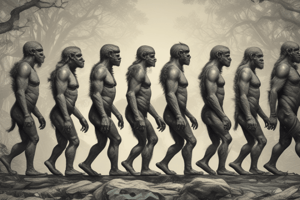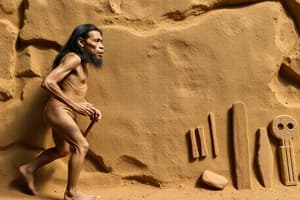Podcast
Questions and Answers
Match the following scientists with their contributions to primatology:
Match the following scientists with their contributions to primatology:
Jane Goodall = Studies on chimpanzee behavior Dian Fossey = Research on mountain gorillas Richard Dawkins = Evolutionary biology and memes Frans de Waal = Social behavior in primates
Match the following brain regions with their primary functions:
Match the following brain regions with their primary functions:
Frontal Lobe = Decision making and planning Temporal Lobe = Processing auditory information Parietal Lobe = Sensory perception and integration Occipital Lobe = Visual processing
Match the following concepts with their definitions:
Match the following concepts with their definitions:
Natural Selection = Survival of the fittest Evolution = Change in allele frequencies over generations Primatology = Study of primates Cognition = Mental processes of acquiring knowledge
Match the following brain structures with their descriptions:
Match the following brain structures with their descriptions:
Match the following stages of human evolution with their characteristics:
Match the following stages of human evolution with their characteristics:
What is the main function of the hippocampus in the brain?
What is the main function of the hippocampus in the brain?
Which structure is primarily responsible for connecting the two hemispheres of the brain?
Which structure is primarily responsible for connecting the two hemispheres of the brain?
What does natural selection primarily lead to in species over time?
What does natural selection primarily lead to in species over time?
Which part of the brain is crucial for language production?
Which part of the brain is crucial for language production?
Which of the following lobes of the brain is primarily involved in processing auditory information?
Which of the following lobes of the brain is primarily involved in processing auditory information?
Match the following pioneers of Psychology with their primary contributions:
Match the following pioneers of Psychology with their primary contributions:
Match the following anthropological subfields with their focus:
Match the following anthropological subfields with their focus:
Match the following major theories in Sociology with their descriptions:
Match the following major theories in Sociology with their descriptions:
Match the following characteristics of culture with their definitions:
Match the following characteristics of culture with their definitions:
Match the following brain structures with their primary functions:
Match the following brain structures with their primary functions:
Match the following aspects of social identity with their definitions:
Match the following aspects of social identity with their definitions:
Match the following stages of human evolution with their representatives or characteristics:
Match the following stages of human evolution with their representatives or characteristics:
Which branch of Anthropology focuses on the study of language and its social contexts?
Which branch of Anthropology focuses on the study of language and its social contexts?
Which psychological theory emphasizes the role of observable behaviors and external stimuli?
Which psychological theory emphasizes the role of observable behaviors and external stimuli?
What is the primary focus of Structural Functionalism in Sociology?
What is the primary focus of Structural Functionalism in Sociology?
Which of the following is not a component of culture?
Which of the following is not a component of culture?
Which lobe of the brain is primarily associated with spatial awareness and perception?
Which lobe of the brain is primarily associated with spatial awareness and perception?
In the context of social institutions, what is the primary goal of educational institutions?
In the context of social institutions, what is the primary goal of educational institutions?
Which of the following correctly distinguishes between ethnocentrism and cultural relativism?
Which of the following correctly distinguishes between ethnocentrism and cultural relativism?
The study of human societies and social behavior is called ______.
The study of human societies and social behavior is called ______.
The theory proposed by ______ emphasizes evolution through natural selection.
The theory proposed by ______ emphasizes evolution through natural selection.
The four major branches of Anthropology are Cultural, Linguistic, Physical, and ______ Anthropology.
The four major branches of Anthropology are Cultural, Linguistic, Physical, and ______ Anthropology.
The ______ lobe is primarily associated with processing auditory information.
The ______ lobe is primarily associated with processing auditory information.
In Psychology, ______ is one of the main theories that focuses on observable behavior.
In Psychology, ______ is one of the main theories that focuses on observable behavior.
The concept of ______ refers to judging another culture solely by the values and standards of one's own culture.
The concept of ______ refers to judging another culture solely by the values and standards of one's own culture.
The primary purpose of social ______ is to meet the needs and goals of individuals within a society.
The primary purpose of social ______ is to meet the needs and goals of individuals within a society.
Flashcards
Natural Selection
Natural Selection
The process by which organisms with traits that are better suited to their environment survive and reproduce more successfully, passing on those advantageous traits to their offspring.
Primatology
Primatology
The scientific study of primates, including their behavior, biology, evolution, and ecology.
Frontal Lobe
Frontal Lobe
The largest part of the human brain, responsible for higher-level cognitive functions such as planning, decision-making, and complex thought processes.
Hippocampus
Hippocampus
Signup and view all the flashcards
Corpus Callosum
Corpus Callosum
Signup and view all the flashcards
Darwin's Theory of Natural Selection
Darwin's Theory of Natural Selection
Signup and view all the flashcards
What is Anthropology?
What is Anthropology?
Signup and view all the flashcards
What is Culture?
What is Culture?
Signup and view all the flashcards
What is Kinship?
What is Kinship?
Signup and view all the flashcards
What is Participant Observation?
What is Participant Observation?
Signup and view all the flashcards
What is Forensic Anthropology?
What is Forensic Anthropology?
Signup and view all the flashcards
What are Major Sociological Theories?
What are Major Sociological Theories?
Signup and view all the flashcards
What are Values, Norms, and Rules?
What are Values, Norms, and Rules?
Signup and view all the flashcards
What is Psychology?
What is Psychology?
Signup and view all the flashcards
What is Learning Theory?
What is Learning Theory?
Signup and view all the flashcards
What is Sociology?
What is Sociology?
Signup and view all the flashcards
What is Structural Functionalism?
What is Structural Functionalism?
Signup and view all the flashcards
What is Conflict Theory?
What is Conflict Theory?
Signup and view all the flashcards
What is Symbolic Interactionism?
What is Symbolic Interactionism?
Signup and view all the flashcards
What is Developmental Psychology?
What is Developmental Psychology?
Signup and view all the flashcards
What is Primatology?
What is Primatology?
Signup and view all the flashcards
What is Natural Selection?
What is Natural Selection?
Signup and view all the flashcards
Study Notes
Evolution
- Darwin proposed natural selection as the driving force behind evolution.
- Primatology studies primates to understand human origins, emphasizing similarities and differences between humans and primates. Key figures include Jane Goodall and Dian Fossey.
- Natural selection is a key concept in evolutionary theory.
- Stages of human evolution are under study.
Stages of Human Evolution
- (Note: Specific stages and details about human evolution are not provided.)
The Brain
- The brain is a complex organ with various functions.
- Key brain regions include:
- Frontal Lobe: (Higher cognitive functions, problem-solving, decision-making)
- Temporal Lobe: (Processing auditory information, language comprehension)
- Parietal Lobe: (Processing sensory information, spatial awareness)
- Occipital Lobe: (Processing visual information)
- Prefrontal Cortex: (Crucial for planning, working memory, and executive functions)
- Broca's Area: (Crucial for speech production)
- Hippocampus: (Memory formation and spatial navigation)
- Cerebellum: (Coordination of movement and balance)
- Corpus Callosum: (Connects the two hemispheres of the brain, facilitating communication between them)
Anthropology
- Anthropology is a social science.
- Major branches include cultural, linguistic, physical, and social anthropology.
- Methods include participant observation.
- Forensic anthropology is a specialized area.
- Kinship is a key concept in anthropology.
- Biases in social science are a consideration.
- Statistics in social science are important tools.
Psychology
- Psychology is a social science.
- Subfields of psychology are discussed.
- Pioneers in psychology include Skinner, Pavlov, Freud, Adler, and Jung.
- Learning theory and behavior theory within psychology are included.
Sociology
- Sociology is a social science discipline.
- Key figures in sociology include Karl Marx.
- Major sociological theories include Structural Functionalism, Conflict Theory, Feminist Theory, and Symbolic Interactionism.
- Concepts such as values, norms, and rules are studied in sociology.
Culture
- Culture's characteristics, features, and components are studied.
- Concepts such as ethnocentrism and cultural relativism are discussed within the context of culture.
Social Institutions and Identity
- Social institutions and identity formation are explored.
- Primary goals of social institutions are reviewed.
- The influence of social institutions on identity is analyzed.
- Social identity and social status are also part of the study of these topics.
Studying That Suits You
Use AI to generate personalized quizzes and flashcards to suit your learning preferences.




